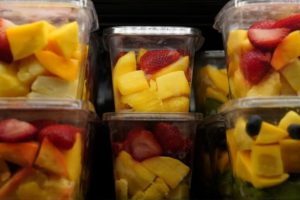 Monsoon weather makes people more susceptible towards a cold or a flu and the weather even makes us crave for certain food items that we should not consume. Here are 5 such food items that are a big no-no during monsoon.
Monsoon weather makes people more susceptible towards a cold or a flu and the weather even makes us crave for certain food items that we should not consume. Here are 5 such food items that are a big no-no during monsoon.
As soon as the first drops of water hit the land and monsoon knocks on our door, our taste buds become extremely active. We feel like having cups of tea and coffee along with the heavenly combination of deep-fried pakoras and samosas.
We start thinking about food items like bhutta (corn) and momos and start craving for them. It is as if the experience of monsoon is incomplete without the food that we are imagining about and salivating at the same time.
However, there are few food items that we should say a big No-No to during the monsoon season.
1. Cut fruits that have been left out for long
A slight change in the weather results in people catching a cold, the flu being contagious contaminates the air, resulting in other people catching the flu as well. Therefore, anything that has been left in the open for long has a chance of getting contaminated and resulting in the person who consumes it, getting ill.
So to avoid that, it is advisable to not eat fruits or vegetables that are sold by the roadside vendors as they vut the fruits in advance. Similar practices should be followed at home too.
2. Deep-Fried food
We know how much you want to eat pakoras and samosas with your hot cup of tea but it is advisable to avoid it. We are saying so, because of the humidity in the weather. The human digestive system is anyways not working in full capacity, the process itself is a little slow during monsoon. So, eating these deep-fried food items may lead to gastronomical complications like bloating and an upset stomach.
3. Sea Food
Seafood should definitely be avoided during monsoon. The reason being, monsoon is the breeding season for fishes and other forms of sea creatures. Fishes contain eggs inside their bodies which when consumed can cause stomach infection or severe food poisoning.
4. Green Leafy Vegetables
Generally, an extremely healthy food option, the green leafy vegetable should be avoided in monsoon as much as possible. The humidity in the weather and the natural dampness in the leafy vegetables makes it the perfect breeding ground for germs. Therefore, lettuce, spinach, cabbage, and cauliflower should be on your not to consume list in the monsoon season.
5. Mushrooms
Mushrooms generally grow in damp areas and have to be properly cleaned before consumption, but during the monsoon season, the risk of bacterial infections is way higher. Therefore to be on a safer side, it is recommended to not eat mushrooms during monsoon.




































 Monsoon weather makes people more susceptible towards a cold or a flu and the weather even makes us crave for certain food items that we should not consume. Here are 5 such food items that are a big no-no during monsoon.
Monsoon weather makes people more susceptible towards a cold or a flu and the weather even makes us crave for certain food items that we should not consume. Here are 5 such food items that are a big no-no during monsoon.












